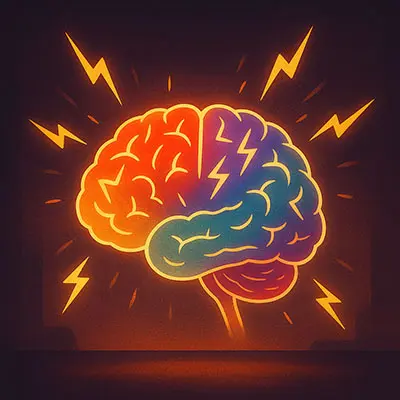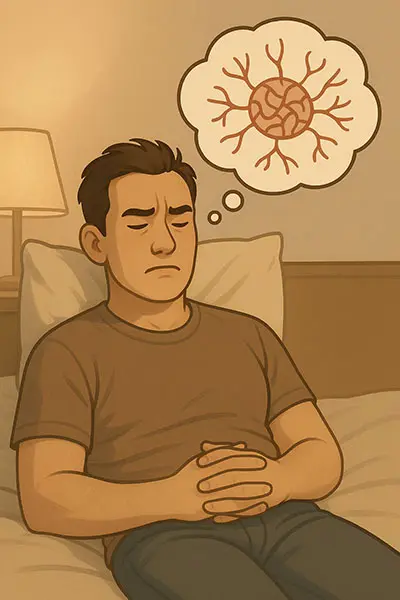“I sleep plenty, but I’m still exhausted.” That sentence echoed in my head for years. No amount of rest fully restored my energy. Doctors often called it burnout or stress, but deep down, I sensed something more complex. That’s chronic fatigue driven by nervous system overload.
Table of Contents
- Introduction
- What Is Chronic Fatigue and Nervous System Overload?
- Why Rest Alone Doesn’t Fix It
- How Chronic Fatigue Feels in Your Body and Mind
- Common Myths About Chronic Fatigue
- Practical Steps to Support Your Nervous System
- Validate Your Exhaustion
- Use Somatic Practices
- Balance Activity and Rest
- Embrace Stillness
- Let Go of Self-Blame
- Seek Trauma-Informed Support
- Chronic Fatigue and the LGBTQ+ Experience
- Q&A: Your Questions Answered
- Conclusion: You Deserve Energy Without Survival Mode
Introduction
Ever wake up after a full night’s sleep and still feel like you’ve been hit by a truck? Your body’s heavy, your brain’s foggy, and even a simple task like answering an email feels like climbing a mountain. Oh man, I totally get it. 😅 For years, I’d sleep eight hours, chug coffee, and still feel like I was running on empty. Doctors called it stress or burnout, but it felt deeper like my body was stuck in overdrive. That’s when I learned about chronic fatigue and nervous system overload, a combo that can leave you exhausted, no matter how much you rest
If you’re nodding along, you’re not alone. Chronic fatigue isn’t just about being tired it’s a complex issue tied to your nervous system, often made worse by stress, trauma, or societal pressures, especially for LGBTQ+ folks facing unique challenges. In this guide, we’ll unpack why rest alone doesn’t cut it, how this overload feels, and practical steps to help you reclaim your energy. Ready to feel more like yourself? Let’s dive in! 🚀

What Is Chronic Fatigue and Nervous System Overload?
Chronic fatigue is more than just feeling sleepy it’s a persistent exhaustion that lingers even after rest, impacting your body, mind, and emotions. When it’s tied to nervous system overload, it means your body’s stress response is stuck in high gear, like a car engine revving non-stop. This can happen when your nervous system is constantly on alert, draining your energy reserves.
According to Mayo Clinic, chronic fatigue syndrome (CFS) affects millions, and while the exact cause isn’t always clear, nervous system dysregulation is a key factor. For some, it’s triggered by stress, trauma, or even societal pressures, making it a complex issue that needs more than just a nap.
Why Rest Alone Doesn’t Fix It
You might think, “If I’m tired, I just need more sleep, right?” Not quite. Here’s why rest alone often falls short:
- Prolonged Hypervigilance: When you’re under constant stress whether from work, relationships, or societal pressures your nervous system stays in fight-or-flight mode. This keeps you wired, even when you’re trying to rest. I used to feel like my body was always “on,” even in bed.
- Adrenal Fatigue: Chronic stress overworks your adrenal glands, which produce stress hormones like cortisol. Over time, this can lead to symptoms like exhaustion and brain fog, as noted by Cleveland Clinic.
- Unresolved Trauma: Trauma, like past abuse or rejection, can keep your nervous system on high alert, making relaxation nearly impossible. Bessel van der Kolk explains in The Body Keeps the Score that trauma lives in the body, not just the mind.
- Emotional Suppression: Bottling up emotions like anger or sadness burns energy, leaving you depleted. For LGBTQ+ folks, suppressing feelings to fit societal norms can add to this burden.
These factors mean that simply sleeping more doesn’t address the root cause you need to regulate your nervous system to truly recover.
Why Chronic Fatigue Often Isn’t Fixed By Rest Alone
- Prolonged hypervigilance keeps nervous system stuck “on”
- Adrenal fatigue from extended fight-or-flight activation
- Unresolved trauma leaves baseline tension high
- Emotional suppression burns internal resources

How Chronic Fatigue Feels in Your Body and Mind
Chronic fatigue and nervous system overload can feel like:
- Physical Tiredness Without Cause: You’re exhausted, but there’s no obvious reason like you didn’t run a marathon, but your body acts like you did.
- Brain Fog: Your thoughts are muddled, making it hard to focus or remember simple things. I once forgot my own phone number during a foggy moment!
- Emotional Numbness: You might feel flat or disconnected, like joy is just out of reach.
- Body Heaviness: Your limbs feel weighed down, even after a full night’s sleep.
- Hypersensitivity to Stress: Small things like a loud noise or a work email can feel overwhelming.
These symptoms can make daily life feel like wading through molasses, affecting work, relationships, and your sense of self.
Common Myths About Chronic Fatigue
There are some big misconceptions about chronic fatigue that can make it harder to manage:
- “You Just Need More Sleep”: Sleep helps, but if your nervous system is stuck in overdrive, it’s not enough.
- “Rest Fixes Everything”: Without addressing dysregulation, rest is like charging a phone with a broken battery.
- “Stimulants Are the Answer”: Coffee or energy drinks might give a temporary boost but can worsen the problem by keeping your system wired.
- “You’re Just Lazy”: Fatigue isn’t laziness it’s a sign your body needs support. Self-shaming only adds stress, as Psychology Today explains.
Understanding these myths can help you approach your fatigue with compassion instead of judgment.

Practical Steps to Support Your Nervous System
Ready to start healing? Here are six practical ways to support your nervous system and ease chronic fatigue:
Validate Your Exhaustion
Your fatigue isn’t a flaw it’s your body’s way of saying it’s been working overtime. Try saying, “My exhaustion is real, and it’s okay to need time to heal.” This simple acknowledgment can reduce guilt and open the door to recovery. Our Self-Compassion Exercises guide has more on this.

Use Somatic Practices
Somatic practices focus on your body to calm your nervous system. Try a body scan: close your eyes, focus on each body part, and notice any tension. Release it with gentle stretches or deep breathing (inhale for 4, hold for 4, exhale for 4). I started doing this after work, and it was like hitting a reset button. Check out Somatic Therapy for Trauma Recovery for more.
Balance Activity and Rest
Avoid the boom-and-bust cycle where you push too hard on good days and crash. Instead, pace yourself: break tasks into small chunks and schedule rest breaks. For example, work for 25 minutes, then rest for 5. This helped me manage my energy without feeling guilty.
Embrace Stillness
Stillness can feel scary when your nervous system’s wired, but it’s key to recovery. Start with short moments of calm, like listening to soft music or using a weighted blanket. I found that sitting quietly with a cup of tea for 5 minutes helped my body learn that calm isn’t dangerous.
Let Go of Self-Blame
Stop beating yourself up for being tired. Instead, practice self-compassion: say, “This isn’t laziness it’s my body healing.” Journaling about your feelings can help. I started writing down three things I did well each day, even small ones, and it shifted my mindset. Try our Journaling for Mental Health prompts.
Seek Trauma-Informed Support
If trauma’s contributing to your fatigue, a trauma-informed therapist can help you process and regulate. For LGBTQ+ folks, finding an affirming therapist is crucial. BetterHelp connects you with professionals who understand these challenges.

Chronic Fatigue and the LGBTQ+ Experience
For LGBTQ+ folks, chronic fatigue can be amplified by unique stressors like discrimination, rejection, or the emotional labor of navigating identity. Coming out, facing microaggressions, or living in unsupportive environments can keep your nervous system on edge, making fatigue feel relentless. I know someone who felt drained from constantly hiding their true self at work it was like carrying an invisible weight.
Finding safe spaces like queer support groups or affirming therapy can make a huge difference. Resources like The Trevor Project offer tailored support for LGBTQ+ mental health. Practicing self-compassion and connecting with others who get it can help you feel less alone and more energized.

How To Gently Support Nervous System Recovery
1️⃣ Validate The Exhaustion As Protective
“My system stayed alert for too long. This fatigue reflects years of survival, not weakness.”
2️⃣ Anchor Safety Through Somatic Work
- Gentle body scans, grounding, and breathwork
- Release muscle tension gradually with movement
3️⃣ Pace Activities To Avoid Crash Cycles
- Alternate gentle activity with intentional rest
- Honor fluctuating energy windows without guilt
4️⃣ Build Tolerance for Stillness
- Train system to associate calm with safety, not danger
- Pair rest with soothing sensory input (soft music, weighted blankets)
5️⃣ Release Self-Blame For Ongoing Fatigue
- “This isn’t laziness it’s my system recalibrating.”
- Compassionate inner dialogue supports deeper healing
6️⃣ Seek Trauma-Informed Support If Needed
- Somatic therapists can address underlying dysregulation
- Safe therapeutic spaces allow nervous system flexibility to return

Q&A: Your Questions Answered
Q: Why doesn’t rest fix my exhaustion?
A: Rest alone can’t reset a dysregulated nervous system. If you’re stuck in fight-or-flight, your body needs somatic practices or therapy to calm down. Learn more in our Grounding Techniques for Anxiety.
Q: Is chronic fatigue permanent?
A: Not at all! With consistent regulation like breathwork or therapy your nervous system can regain balance. Recovery takes time, but it’s possible.
Q: How do I avoid energy crashes?
A: Pace yourself by balancing activity and rest, and listen to your body’s signals. Avoid overusing stimulants like caffeine, which can mask the problem.
Q: Can trauma cause chronic fatigue?
A: Yes, unresolved trauma can keep your nervous system on high alert, draining energy. Trauma-informed therapy can help. Bessel van der Kolk has great insights on this.
Q: How can LGBTQ+ folks manage this fatigue?
A: Seek affirming spaces and therapists who understand your experiences. Community support, like groups through The Trevor Project, can be a lifeline.
Conclusion: You Deserve Energy Without Survival Mode
Your exhaustion isn’t a sign of failure it’s your body’s way of saying it’s been working hard to keep you safe. By validating your fatigue, using somatic practices, and seeking support, you can start to reclaim your energy. You don’t have to live in survival mode forever. As Bessel van der Kolk says, “The body keeps the score, but it also knows how to heal.”
Take one small step today maybe a deep breath or a kind word to yourself and know that healing is within reach. What’s one thing you’ll try to support your energy? Share in the comments we’re rooting for you! 😊 Explore more ways to nurture yourself at our Self-Care Hub.

Related articles that I recommend you read
- Self-Care Hub: Must-Know Self-Care Practices for Your 20s to 40s – Ties to self-care tips for energy recovery.
- Mindfulness for Stress Relief – Aligns with mindfulness techniques for nervous system regulation.
- Emotional Intelligence Guide – Supports self-awareness and emotional management for fatigue.
Reliable sources for preparing part of this article
- Cleveland Clinic – A trusted U.S. source for chronic fatigue insights.
- Psychology Today – Supports the article’s focus on nervous system health.
- The Trevor Project – Relevant for LGBTQ+ readers facing fatigue from societal stress.
✨ Last updated on 29.08.2025











Leave a Reply